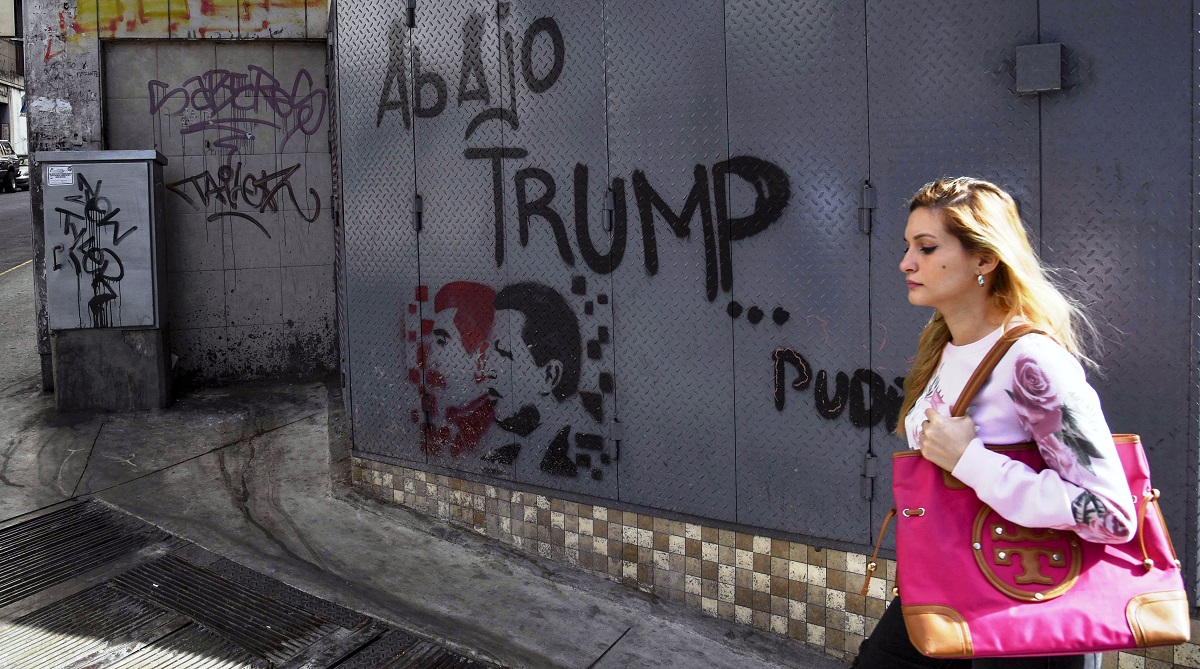Man sets himself on fire in New York outside Trump’s criminal trial court
The man threw pamphlets into the air and poured accelerant on himself, according to the reports.
Decidedly defiant has been Maduro’s response, which chimes oddly with President Trump’s overtures to his rival.

A woman walks past a grafitti depicting late Venezuelan president Hugo Chavez (R), President Nicolas Maduro and a legend reading "down with Trump" in Caracas, on January 24, 2019. (Photo by YURI CORTEZ / AFP)
Venezuela is in crisis, a combination of the quirky and the violent. Wednesday’s declaration of the Opposition leader, Juan Guaidó, as the Latin American country’s President is rather exceptional in itself. Fragile as his authority must be, he has almost immediately strengthened his defences with the prompt recognition of Canada, Brazil, Colombia and Argentina and also, of course, Donald Trump. Anxious to articulate the certitudes of democracy, the European Union has said that the voice of the people “cannot be ignored”. Altogether, he has ensured a fair measure of credibility at the threshold. Remarkable must be the concert of the Americas and Europe to ensure a semblance of stability in a country that has been roiled by violence against the regime of President Nicolás Maduro. It is pretty obvious that the deaths of 14 people during two nights of violence between the supporters of Guaido and Maduro have brought matters to a head. As it turns out, a significant swathe of the world has endorsed Guaido’s arrogation of authority, albeit a self-appointed Head of State in a direly fractious land. Clearly, there has been a dramatic escalation of efforts to eject Maduro from the presidential palace in Caracas. The transition, coupled with the international support, reflects the groundswell of disaffection against Maduro’s rule, most particularly the authoritarianism and economic slide. President Trump, in the midst of the controversy over the State of the Union address, merely tests the murky waters when he warns that “all options are on the table” if Maduro responds with force. No less critical is the economic facet of the US intervention. Vice-President Mike Pence has let it be known that the US would use “the full weight of our diplomatic and economic pressure”. Specifically, the US will “look at ways” to transfer Venezuelan assets and oil revenues to Guaidó and the opposition-run National Assembly.
Decidedly defiant has been Maduro’s response, which chimes oddly with President Trump’s overtures to his rival. It is hard not to wonder whether the arrogation of authority would have happened without Guaido first making sure of White House support. Ahead of the change of guard, Maduro had severed relations with the US, ordering all American diplomats to leave the country within 72 hours. There is bound to be a dramatic shift in the diplomatic paradigm in accord with the transition, verily a coup and no less. “They intend to govern Venezuela from Washington,” Maduro screamed from the people’s balcony of the palace. The nature of America’s political and economic meddling confirms the outgoing President’s worst misgivings. The geopolitical plot thickens with the reaction of Russia, a major ally of Venezuela ~ “The United States is trying to carry out an operation to organise the next ‘colour revolution’ in Venezuela.”
Advertisement
Advertisement